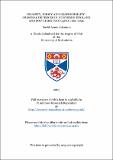Insanity, idiocy and responsibility : criminal defences in northern England and southern Scotland, 1660-1830
Abstract
This thesis compares criminal defences of insanity and idiocy between 1660 and 1830 in northern England and southern Scotland, regions which have been neglected by the historiographies of British crime and "insanity defences". It is explained how and why English and Scottish theoretical principles differed or converged. In practice, however, courtroom participants could obtain to alternative conceptions of accountability and mental distraction. Quantitative and qualitative analyses are employed to reveal contemporary conceptions of mental afflictions and criminal responsibility, which provide inverse reflections of "normal" behaviour, speech and appearance. It is argued that the judiciary did not dictate the evaluation of prisoners' mental capacities at the circuit courts, as some historians have contended. Legal processes were determined by subtle, yet complex, interactions between "decision-makers". Jurors could reach conclusions independent from judicial coercion. Before 1830, verdicts of insanity could represent discord between bench and jury, rather than the concord emphasised by some scholars. The activities of counsel, testifiers and prisoners also impinged upon the assessment of a prisoner's mental condition and restricted the bench's dominance. Despite important evidentiary evolutions, the courtroom authentication of insanity and idiocy was not dominated by Britain's evolving medical professions (including "psychiatrists") before 1830. Lay, communal understandings of mental afflictions and criminal responsibility continued to inform and underpin the assessment of a prisoner's mental condition. Such decisions were affected by social dynamics, such as the social and economic status, gender, age and legal experience of key courtroom participants. Verdicts of insanity and the development of Britain's legal practices could both be shaped by micro- and macro-political considerations. This thesis opens new avenues of research for British "insanity defences", whilst offering comparisons to contemporary Continental legal procedures.
Type
Thesis, PhD Doctor of Philosophy
Collections
Items in the St Andrews Research Repository are protected by copyright, with all rights reserved, unless otherwise indicated.

